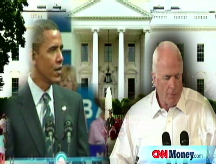Democrats push back
House Speaker says lawmakers will demand taxpayer protection - Paulson calls for swift action.
NEW YORK (CNNMoney.com) -- Democratic leaders on Capitol Hill said on Sunday that the Bush administration's $700 billion proposal to bail out the financial system lacked necessary safeguards for taxpayers and homeowners.
Democrats want the measure to include independent oversight, homeowner protections and limits on executive compensation, House Speaker Nancy Pelosi, D-Calif., said in a statement early Sunday evening.
"We will not simply hand over a $700 billion blank check to Wall Street and hope for a better outcome," she said.
Pelosi said that Congress will take action on the bailout this week but will act "to insulate Main Street from Wall Street."
Earlier on Sunday, Treasury Secretary Henry Paulson called on Congress to move swiftly.
"We need this to be clean and quick," Paulson said on ABC's "This Week."
Treasury spokespeople were not immediately available for comment on Pelosi's statement.
The legislative proposal is the centerpiece of what would be the most sweeping economic intervention by the government since the Great Depression. (Read the text here.)
Paulson, Federal Reserve Chairman Ben Bernanke and other officials have said in recent days that the lack of easy credit between banks and other financial institutions threatens to inflict serious damage on the economy if not addressed immediately.
The plan would allow the Treasury to buy up mortgage-related assets from American based companies and foreign firms with a big exposure to these illiquid assets. The aim is for the government to buy the securities at a discount, hold onto them and then sell them for a profit.
"What we're doing is first stabilizing the market," Paulson said Sunday morning. "Once we stabilize the market, we need to ask ourselves how did we get here and how do we avoid getting here again."
"We need a lot of reforms, and this is going to be something Congress and the next administration are going to be working on for some time," Paulson added.
Paulson also stressed that the administration has begun discussions with foreign governments to push them to institute similar action, though he stressed that none have made any commitments to do so yet.
Sen. Christopher Dodd, D-Conn., chairman of the Senate Banking Committee, agreed with Paulson that speedy passage of the bill was necessary. "We need to do it quickly," Dodd said on "This Week." "We need to give the Secretary the authority to work."
House Minority Leader John Boehner, R-Ohio, said Sunday that fellow lawmakers should not try to load up the bill with amendments. "This is not a time for people to be playing games - we need to keep it clean and simple."
Experts liken the Treasury's plan to the Home Owners' Loan Corp., put in place in 1933 to stem foreclosures and help refinance defaulting mortgages and boost banks' liquidity.
The mortgage plan is part of an extraordinary effort by the federal government to contain a financial crisis that has forced a major realignment on Wall Street and has started rippling out to Main Street.
In the past week, two of the nation's most venerable investment banks - Lehman Brothers (LEH, Fortune 500) and Merrill Lynch (MER, Fortune 500) - have fallen and the Federal Reserve was forced to lend $85 billion to prevent the sudden collapse of insurance giant American International Group (AIG, Fortune 500).
Meanwhile, mainstay financial institutions are scrambling to raise cash and shore up their books as lending has frozen up and investor confidence has sunk.
"You can't describe how ugly it would look if we don't act," Boehner said.
The bill is being hammered out on Capitol Hill. The House Financial Services Committee has scheduled a Wednesday hearing to debate it.
Among the Democrats advocating that economic stimulus be part of the bailout package was Rep. Barney Frank, D-Mass., chairman of the House Financial Services Committee.
"It's kind of hard to tell the average American that we are going to continue to have foreclosures that destabilize neighborhoods and deprive cities of revenue they need, but we're going to buy up the bad paper," Frank said on CBS' "Face the Nation."
Frank advocated higher taxes on people with income exceeding $1 million a year. And the idea that the deficit would force tax increases even made it across party lines.
"When we add an additional trillion dollars to the debt, the burden of the taxpayer, sooner or later there's got to be a reckoning," Sen. Richard Shelby, R-Ala., ranking member on the Senate Banking Committee, told "Face the Nation." "This is the mother of all bailouts."
The administration's proposal also requests that Congress authorize an increase to the nation's debt ceiling. Currently, it's set to rise to $10.6 trillion for fiscal year 2009 - which runs from October 2008 through September 2009. But the proposal requests that limit be increased to $11.315 trillion to allow for the purchases of mortgage-backed assets.
The debt limit is a ceiling on how much debt the federal government is allowed to take on. Budget experts say it acts as a break on spending mostly because of political pressure, because lawmakers don't like to vote to raise it. Lawmakers are free to change it if they have reason, however.
Paulson on Sunday acknowledged that the plan involves considerable risk for taxpayers, but said that the Treasury should recoup at least some of what it will spend on this bailout.
"We're talking about hundreds of billions of dollars, but remember this is not an expenditure, this is money that is being used to purchase illiquid mortgage assets that are very difficult to value," Paulson said on NBC's "Meet the Press."
"They will be held [by the Treasury] and they will be resold at some time. And so we can't determine what the cost is today," Paulson said. "That's going to be based on how quickly the economy recovers, what happens in the mortgage market." ![]()






